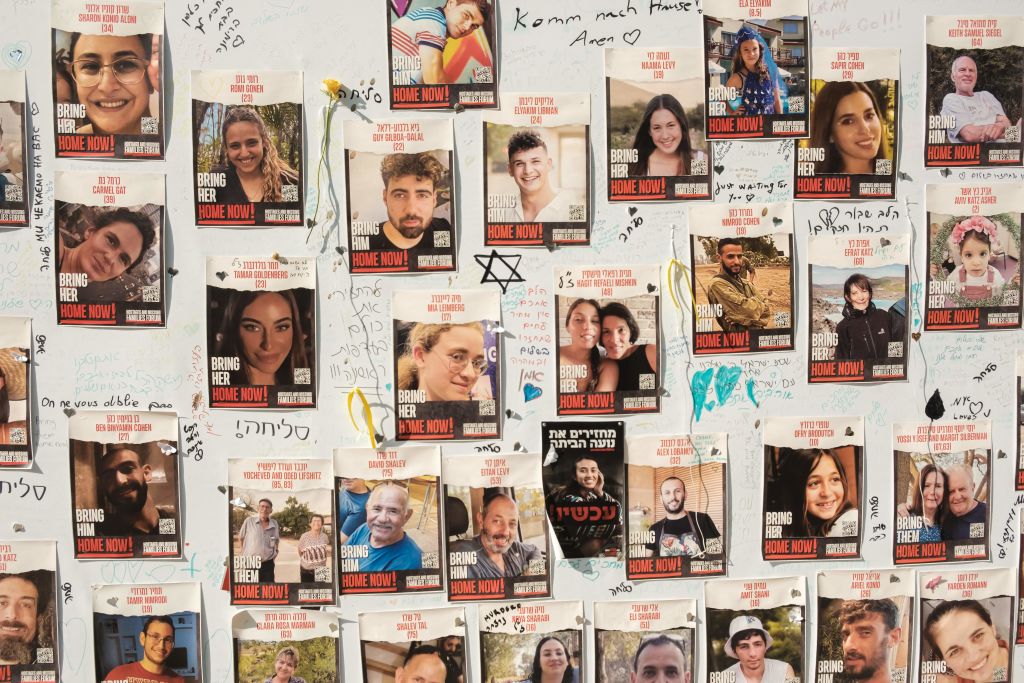
Something unusual and profound happened in Davos this year. I expected dynamic conversations on artificial intelligence, debates about global politics, and meetings with business and government leaders. True to form, those activities featured prominently during my time at the World Economic Forum’s annual meeting. However, there was one encounter I did not expect to have: a heart-wrenching discussion with four extraordinarily courageous Israeli women.
Two of these individuals were themselves hostages in Gaza, the other two have loved ones still being held captive by Hamas. In an arena of power and influence, it was these humble and strong women who imparted upon me the greatest sense of urgency. They spoke as powerfully as any business titan or world leader. And then some.
Noam Peri grew up in Kibbutz Nir-Oz, a small, tight-knit farming village. Her 79-year-old father, an admirer of the arts, a dedicated family man, and a steadfast peace advocate, remains a hostage.
Nili Margalit was taken on October 7. As a nurse, she tended to the wounded among her fellow hostages. What she lacked in medical supplies, she made up for with her compassion. Now free, her heart remains with those who are still in captivity.
Moran Stela Yanai, a jewelry maker, attended the Supernova music festival to sell her wares and enjoy the camaraderie. Hobbling on an injured leg, a physical reminder of her ordeal, she bravely spoke through tears of the treatment she suffered at the hands of her captors.
More From TIME
Rachel Goldberg is the mother of Hersh, a 23-year-old man whose arm was blown off by grenades before he was taken hostage. She wears a homemade tag with the number of days Hersh has been held captive. When we met, that number stood at 103.
These women deserve to be heard. We must heed their call for the release of the hostages. All of us. They must have our active support, and not just for a day, but until all of the captives have been freed. There should be nothing political about this issue. This is about human decency. The hostages are in dire conditions—reports of food shortages, torture, and sexual abuse. As such, every minute counts.
I say this while recognizing the broader spectrum of sorrow and loss in this conflict, including the innocent families in Gaza, caught in the crossfire, who endure their own tragedies. What binds us as people should urge us to look beyond borders and divisions. This is call to action for our common humanity.
It is our moral duty, as global citizens, to take the necessary steps to help the hostages. To start, we can learn more about them. They are real, innocent people facing unspeakable cruelty.
As citizens of the digital generation, we have the opportunity to raise public awareness, calling for the release of all hostages using the hashtag #BringThemHomeNow. We must rally around those elected officials who are advocating to bring the hostages home. By participating in the democratic process—sending an email or calling our senators, representatives, and the White House—we can give a voice to the hostages.
Join Ms. Goldberg, just as I did in Davos, by wearing a piece of tape on your shirt, counting the number of days that the 136 hostages are still not home. As the devoted mom told me, it reminds the world of the inhumanity at play.
As a healthcare leader, I have a responsibility to stress the urgent need for hostages to gain access to medication. International organizations need unfettered access to assess the conditions of the hostages, so that they can receive the necessary care. Supporting the families of hostages, and of course, the hostages themselves, does not end when they are brought home; mental health services must be made available to those in need, for as long as necessary.
The conditions for a return to calm and stability should be our priority. We owe it to the hostages to hold tightly to the hope that eventual peace, and the end to this cycle of violence, is within reach.
I will sign off with a question: Imagine if it were your loved one being held captive. What would you do?
More Must-Reads from TIME
- Introducing the 2024 TIME100 Next
- The Reinvention of J.D. Vance
- How to Survive Election Season Without Losing Your Mind
- Welcome to the Golden Age of Scams
- Did the Pandemic Break Our Brains?
- The Many Lives of Jack Antonoff
- 33 True Crime Documentaries That Shaped the Genre
- Why Gut Health Issues Are More Common in Women
Contact us at letters@time.com